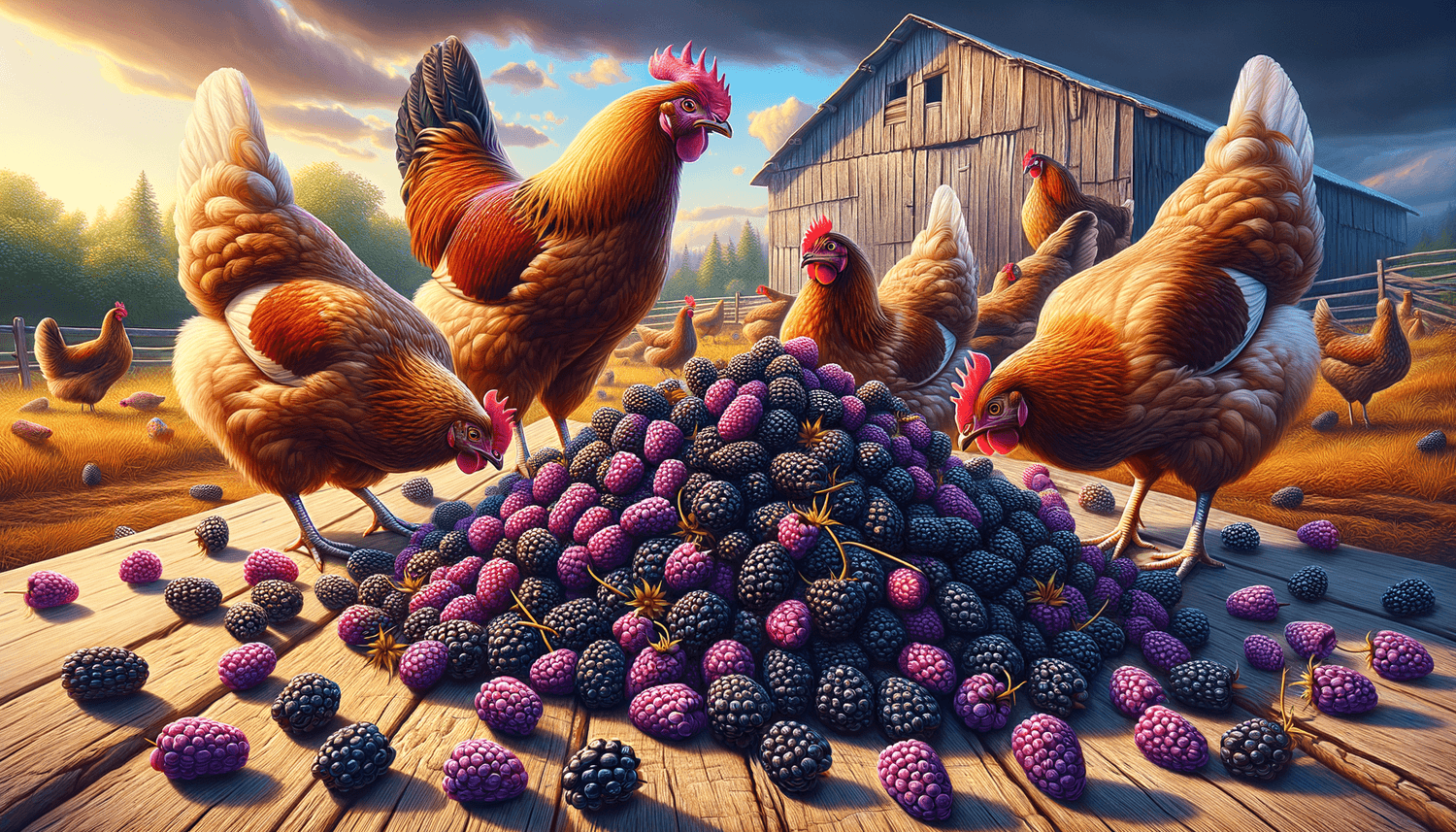Cluck your way to happiness with this berry amazing topic! As a backyard chicken enthusiast, you’ve probably explored an eggs-traordinary variety of tasty treats for your feathered friends. But have you ever wondered, “Can chickens eat blackberries?” In this fun and informative blog post, we’ll peck our way through the answer to this question, dabble in the importance of a balanced diet, reveal the benefits and possible risks, scratch up some info on the nutritional value, and even learn how to prepare these sweet berries for our cluck-tastic pals!
Can chickens eat blackberries?
Yes, chickens can safely eat blackberries! These juicy, antioxidant-rich fruits make a delicious and nutritious treat for your backyard flock. Just make sure to give them in moderation to maintain a balanced diet, as too many blackberries could lead to digestive issues.
Chickens need a balanced diet too
Just like humans, chickens require a balanced diet to stay healthy and happy. Providing the right nutrients is essential for the proper growth, egg production and general well-being of your feathered friends.
A chicken’s diet should primarily consist of a high-quality chicken feed, making up around 80-90% of their nutritional intake. This includes a mix of grains, minerals, and vitamins, ensuring that your flock receives all the necessary nutrients they need to thrive.
The remaining 10-20% of their diet can feature tasty treats like fruits and vegetables, adding variety and extra vitamins. Blackberries, as well as other appropriate fruits and veggies, can be great additions for a sprinkle of extra fun in your chickens’ balanced menu.
Nutritional value of blackberries for chickens.
Feeding blackberries to chickens offers several nutritional benefits. Blackberries are a rich source of vitamins, such as vitamins C, K, and A. Vitamin C boosts the immune system and aids in fighting off infections, while vitamin K plays a critical role in blood clotting and maintaining bone health. Vitamin A has multiple functions, including supporting vision, skin and feather health, and improving overall growth and immune function.
Aside from vitamins, blackberries also contain essential minerals like calcium and potassium. Calcium is essential for the proper formation of eggshells and to keep their bones strong. Potassium contributes to the proper functioning of the nervous and muscular systems, keeping your chickens both healthy and active.
Blackberries are predominantly water content, contributing to the hydration of your flock, especially on hot summer days when they need a little extra moisture to stay cool. Moreover, they are packed with antioxidants, which help to combat free radicals and reduce oxidative stress, keeping your chickens in good health.
Lastly, blackberries are high in dietary fiber, which can help support their digestive system. However, it is essential to offer blackberries in moderation because excessive fiber could cause digestive issues. Overall, blackberries can serve as a nutritious, hydrating, and enjoyable treat for your backyard chickens, provided they are given in the context of a balanced feeding plan.
Nutrition table of blackberries for chickens.
| Information | Description |
|---|---|
| Nutritional Value | High in vitamins C, K, and A, and minerals such as calcium and potassium, antioxidants and fiber. |
| Suggested Serving Size | A small handful per chicken as a treat, making up no more than 10-20% of their diet. |
| Safe Feeding Practices | Offer in moderation, ensuring it doesn’t replace their regular chicken feed. |
| Preparation | Rinse blackberries and serve whole, no need to chop, peel, or cook. |
| Potential Risks | Excessive fiber could lead to digestive issues if fed too often; always feed in moderation. |
| Hydration | Rich in water content, contributing to your flock’s hydration, especially during hot weather. |
| Digestion | Dietary fiber in blackberries supports a healthy digestive system. |
| Seasonal Availability | Peak season is during summer, but they can be found in stores year-round. |
| Other Benefits | Adding variety and enjoyment to your chickens’ diet while offering extra vitamins and minerals. |
Alternative fruits and vegetables for chickens
Apart from blackberries, there is a wide range of fruits and vegetables that are both safe and beneficial for your backyard chickens. Some popular choices include apples (without seeds), bananas, berries (such as raspberries and blueberries), and watermelon. Leafy greens, including kale, spinach, and lettuce, make for an excellent nutritious snack as well.
When feeding these, be mindful of moderation, keeping treats within the recommended 10-20% of their diet. Experimenting with different fruits and vegetables will add delightful variety to your chickens’ menu while increasing their nutrient intake.
Fruits and vegetables to avoid
While many fruits and vegetables are safe for chickens, a few can be toxic or harmful to their health. Some foods to avoid include avocados, raw potatoes, green tomatoes, and treats with seeds or pits like cherries or apricots. It’s important to thoroughly research any food item before offering it to your flock to ensure their safety and well-being.
Making the most of treats
Introducing treats like blackberries into your chickens’ diet offers an excellent opportunity for bonding and socializing with your flock. You can scatter the treats on the ground or use a treat dispenser to encourage them to scratch and forage. Interactive feeding also keeps chickens physically and mentally stimulated, promoting natural behaviors and overall happiness.
In conclusion, feeding blackberries and other suitable treats to your backyard chickens adds variety and nutritional value while enhancing your bond with your feathery friends. Always prioritize a balanced diet by providing high-quality chicken feed and carefully monitor any treats you offer to ensure the long-term health and happiness of your flock.

















